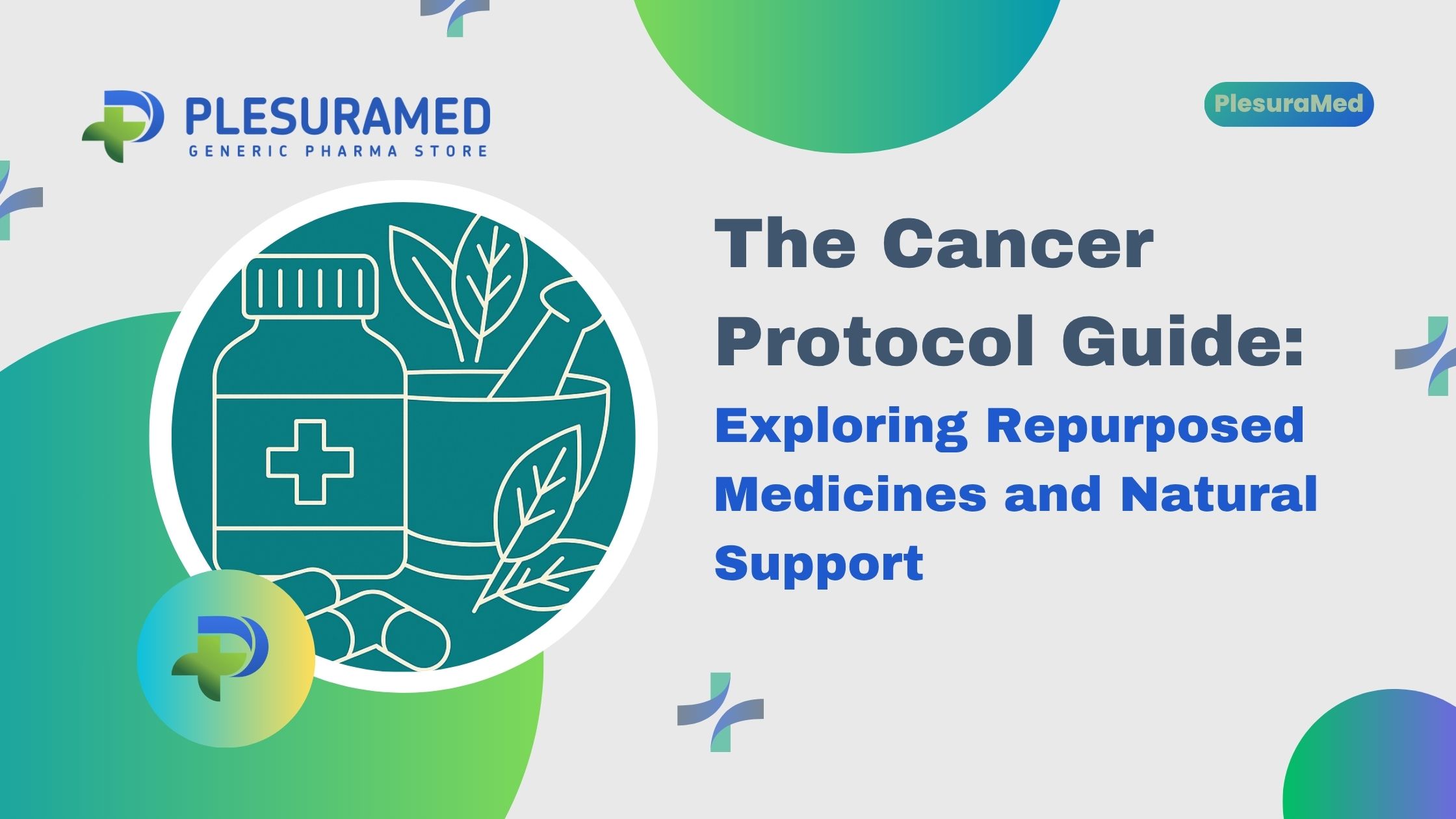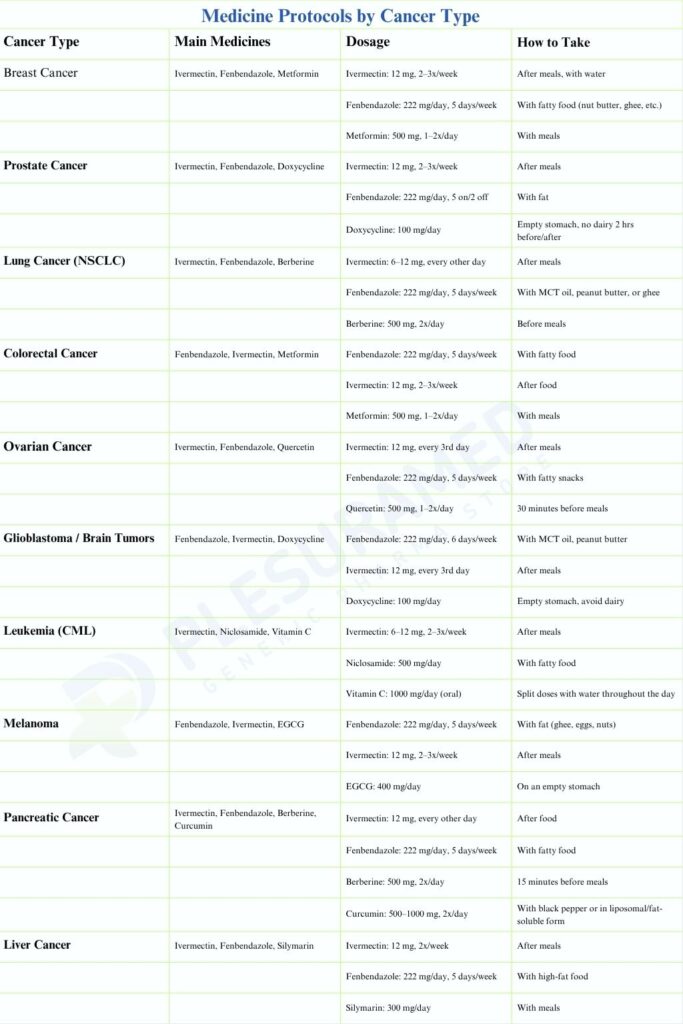The Cancer Protocol Guide: Exploring Repurposed Medicines and Natural Support

Over time, a change has occurred among cancer patients and medical specialists, that they are more focused on “repurposed medicines” originally, medications used in the treatment of other diseases, yet readjusted to treat cancer. Such integrants as natural supplements and metabolic therapies are also gaining more and more attention as cancer treatments have come to be.
This guide shows you the different cancer types, the medicines being developed, the ways the drugs function, the recommended dose, and the natural support that the patients are following in their personal protocols.
What Are Repurposed Medicines?
Repurposed pharmaceuticals are treatments that have been licensed for non-cancer uses but are being explored or used off-label to combat cancer. Antiparasitic medicines, antibiotics, metabolic regulators, and anti-inflammatory medications are some examples. Some of these show potential for addressing cancer metabolism, immunological resistance, and tumor development processes.
Some older drugs, such as Ivermectin, Fenbendazole, and Niclosamide, which were initially intended to treat parasites or infections, are currently being explored and used by patients as off-label cancer treatments. Here’s an in-depth look at how these medications may help treat 10 prevalent malignancies, including dosage, use, and scientific reasoning.
Cancer Types and Their Protocols
1. Breast Cancer
Breast cancer is a type of cancer that forms in tissue in the breast and is often hormone-driven (estrogen, progesterone, HER2). If not treated, it can spread to other parts of the body, like lymph nodes or bones.
Dosage & How to Take
| Medicine | Dosage | How to Take |
| Fenbendazole | 222 mg/day, 5 days/week | With fatty food (peanut butter, olive oil, ghee) |
| Ivermectin | 12 mg, 3x/week | After a meal, with a full glass of water |
| Metformin | 500 mg, 1–2x/day | With meals to avoid stomach upset |
| Curcumin | 500–1000 mg, 2x/day | With black pepper or in liposomal form for best absorption |
2.Prostate Cancer:
Prostate cancer is a very slow-growing disease in most men but may manifest its aggressiveness at a later stage. The disease is heavily reliant on the male hormones like testosterone.
Dosage & How to Take
| Medicine | Dosage | How to Take |
| Fenbendazole | 222 mg/day, 5 on/2 off | Take with healthy fat (nut butter, cheese) |
| Ivermectin | 12 mg, 2–3x/week | After meals, drink water |
| Doxycycline | 100 mg/day | On an empty stomach, avoid dairy for 2 hours before/after |
| Vitamin D3 | 4000–5000 IU/day | Take with fat-containing meal (morning best) |
3. Lung Cancer (NSCLC)
Non-Small Cell Lung Cancer is the most common type of lung cancer. It’s often linked to smoking and can be aggressive if not treated early.
Dosage & How to Take
| Medicine | Dosage | How to Take |
| Fenbendazole | 222 mg/day, 5 days/week | With MCT oil, ghee, or nut butter |
| Ivermectin | 6–12 mg every other day | After food, with water |
| Berberine | 500 mg, 2x/day | Before meals |
| NAC | 600 mg, 2x/day | With water, away from food if tolerated |
4. Colorectal Cancer
This cancer affects the colon or rectum and is influenced by diet, lifestyle, and inflammation. It often starts as small polyps.
Dosage & How to Take
| Medicine | Dosage | How to Take |
| Fenbendazole | 222 mg/day, 5 days/week | With fatty meal |
| Ivermectin | 12 mg, 2–3x/week | After food, with water |
| Metformin | 500 mg, 1–2x/day | With meals |
| Aspirin | 75–100 mg/day | With food, only under doctor supervision |
5. Ovarian Cancer
A hard-to-detect cancer that begins in the ovaries. Symptoms are subtle, and it often spreads before diagnosis.
Dosage & How to Take
| Medicine | Dosage | How to Take |
| Fenbendazole | 222 mg/day, 5 days/week | With a high-fat snack |
| Ivermectin | 12 mg every 3rd day | After meals |
| Quercetin | 500 mg, 1–2x/day | 30 minutes before meals, with water |

6. Glioblastoma / Brain Tumors
A fast-growing, deadly brain cancer that’s hard to treat due to its location and resistance to standard therapies.
Dosage & How to Take
| Medicine | Dosage | How to Take |
| Fenbendazole | 222 mg/day, 6 days/week | With MCT oil or peanut butter |
| Ivermectin | 12 mg every 3rd day | After food, with water |
| Doxycycline | 100 mg/day | Empty stomach, no dairy 1 hour before/after |
| CBD Oil | 10–50 mg/day | Under tongue or mixed in coconut oil (as advised by a practitioner) |
7. Leukemia (CML)
Chronic Myeloid Leukemia affects blood and bone marrow, usually due to a genetic mutation. It progresses slowly but needs lifelong management.
Dosage & How to Take
| Medicine | Dosage | How to Take |
| Ivermectin | 6–12 mg, 2–3x/week | With food, swallow with full water |
| Niclosamide | 500 mg/day | With fatty food (butter toast or avocado) |
| Vitamin C | 1000 mg oral or IV | Oral: split into 2–3 doses with water; IV under professional supervision |
8. Melanoma
An aggressive form of skin cancer caused by UV damage. It can spread quickly if not treated early.
Dosage & How to Take
| Medicine | Dosage | How to Take |
| Fenbendazole | 222 mg/day, 5 days/week | With fat (like eggs or ghee) |
| Ivermectin | 12 mg, 2–3x/week | After meals |
| EGCG | 400 mg/day | Empty stomach, morning preferred |
9. Pancreatic Cancer
This cancer grows in the pancreas and is often diagnosed late. It’s resistant to treatment and spreads rapidly.
Dosage & How to Take
| Medicine | Dosage | How to Take |
| Fenbendazole | 222 mg/day, 5 days/week | With high-fat food |
| Ivermectin | 12 mg every other day | After meals |
| Berberine | 500 mg, 2x/day | Before meals |
| Curcumin | 500–1000 mg, 2x/day | With black pepper or in liposomal form |
10. Liver Cancer
Starts in the liver cells and is commonly linked to alcohol, hepatitis, or fatty liver disease. Often diagnosed at an advanced stage.
Dosage & How to Take
| Medicine | Dosage | How to Take |
| Fenbendazole | 222 mg/day, 5 days/week | With healthy fat (nut oil, milk) |
| Ivermectin | 12 mg, 2x/week | After meals |
| Silymarin | 300 mg/day | With meals |
Common Supplements Table
| Supplement | Role in Cancer Protocol | How to Take |
| Curcumin | Anti-inflammatory, reduces tumor growth | With black pepper or fat-based supplement |
| CBD Oil | Immune support, anxiety relief | Sublingually or mixed with oil |
| Vitamin D3 | Immune modulation, reduces tumor spread | With fat-rich food |
| Berberine | Blocks sugar supply to tumors | 15 mins before meals |
| Milk Thistle (Silymarin) | Liver support during chemo or drug detox | With meals |
| Quercetin | Fights inflammation, reduces drug resistance | 30 mins before meals |
| NAC (N-Acetyl Cysteine) | Antioxidant, protects lungs and liver | With water, away from meals |
| EGCG (Green Tea Extract) | Antioxidant, useful in skin & hormone cancers | Empty stomach or 1 hr before food |
| Metformin | Lowers glucose, suppresses tumor energy | With meals (monitor blood sugar) |
| Doxycycline | Weakens mitochondrial energy in tumor cells | Empty stomach, no dairy 2 hours around dosing |
Conclusion:
While traditional cancer treatments like chemotherapy, radiation, and surgery remain standard, repurposed drugs such as Ivermectin, Fenbendazole, Metformin, Doxycycline, Niclosamide and others are opening up new possibilities for support and healing especially for patients seeking complementary options.
These medicines are:
✅ Often low-cost and widely available
✅ Backed by early studies and growing anecdotal reports
✅ Believed to target cancer metabolism, immune evasion, and inflammation.

